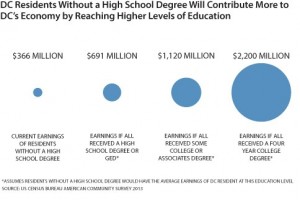The District can help residents get good jobs by doing more to coordinate its many adult education and training programs, and by focusing resources on the thousands of residents who lack a high school degree. Making sure adults are able to get basic education and then easily transition to more advanced training will allow the District to get the most out of its investments in jobs. Improving the employment prospects of DC households is good for the entire city, leading to more stable families and more spending in local communities. (Click on figure below for better viewing.)
 There is tremendous potential for changing how the District approaches these services, with a new mayor focused on improving residents’ job chances, a new DC taskforce focused on adult education and training, and recent changes in federal training programs. A new report from a number of non-profit partners, including DCFPI, recommends how DC’s leaders can take advantage of these opportunities.
There is tremendous potential for changing how the District approaches these services, with a new mayor focused on improving residents’ job chances, a new DC taskforce focused on adult education and training, and recent changes in federal training programs. A new report from a number of non-profit partners, including DCFPI, recommends how DC’s leaders can take advantage of these opportunities.
- Put more residents on a career path: Many states and cities are creating clearer connections between adult education programs and training programs, so that a high school diploma or GED is just a first step toward additional education and training, not an end. A District taskforce charged with developing this so-called “career pathways” approach will issue its report this year. And recent changes in federal law encourage DC to unify job training plans across agencies. A well-integrated education and training system will ensure residents get the right kind of help and are connected to a job when their training is done. The District offers a variety of adult education and job training services across many agencies, as DCFPI identified a few years ago. Mayor Bowser has stressed the need to better coordinate these efforts, and the recommendations of the Career Pathways taskforce can serve as a guide.
- Focus on residents who need the most help: About 60,000 DC adults DC lack a high school diploma, and many have literacy skills too low to take advantage of job training. Investing more in basic education, in the context of job preparation, will be important.
- Support successful programs: The District should do more to measure the outcomes of education and training programs, to ensure that the most effective practices are used, and to offer technical assistance to help education and training providers succeed.
- Allow the Workforce Investment Council to lead: Mayor Bowser should enable the WIC to play a central role in reforming how the city approaches adult education and job training. The WIC oversees federal job training programs and advises the mayor and DC Council on DC’s workforce investment system. It is led by the private sector — including local businesses and organized labor — and also includes government officials. The WIC is convening the Career Pathways taskforce and has responsibility under the new federal law for helping coordinate education and training services.
To print a copy of today’s blog, click here.
